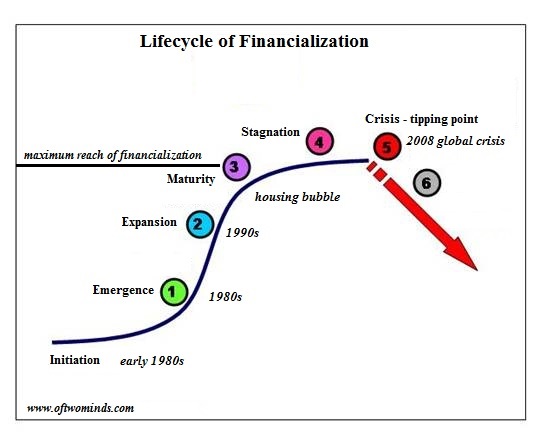"How Do We Create Value When Knowledge Is Almost Free?"
From
Of Two Minds:
Credentials are increasingly in over-supply; problem-solving skills are scarce.
How do we create value in an economy that is increasingly dependent on knowledge?
The answer is complicated by the reality
that knowledge is increasingly digital and "unownable" and therefore almost free.
Financialization as a substitute for creating value has run its course.

The crony-capitalist answer is always the same, of course: bribe the government to create
and enforce private monopolies. This process has many variations, but a favored one
is to deepen the regulatory moat around an industry to the point that competition is
virtually eliminated and innovation is shackled.
Businesses protected by the regulatory moat can charge whatever they wish, becoming
monopolistic rentiers that are parasites on the consumer and economy.
State-crony-capitalism destroys democracy and the economic vitality of the nation.
I've covered this many times, and there is no solution to this oppressive marriage of
state and monopoly other than innovations that open wormholes in the monopoly.
This is where knowledge comes in, as new forms of knowledge (not just technical innovations,
but new business models), once digitized, can be distributed at near-zero cost.
This almost-free knowledge creates another problem: how do we create value in a knowledge
economy when knowledge is increasingly free?
Correspondent Dave P. offered one answer: static knowledge is indeed increasingly free,
but dynamic information (such as market conditions) generates value to those who need
actionable, timely information.
One example of this might be a Bloomberg terminal, which delivers a flood of information
for a monthly fee.
Another source of value is generated by firms offering a warehouse of free knowledge--for
example, YouTube. The instructional videos are free to the user, but YouTube skims
an advertising income from every view....
....
MORE
